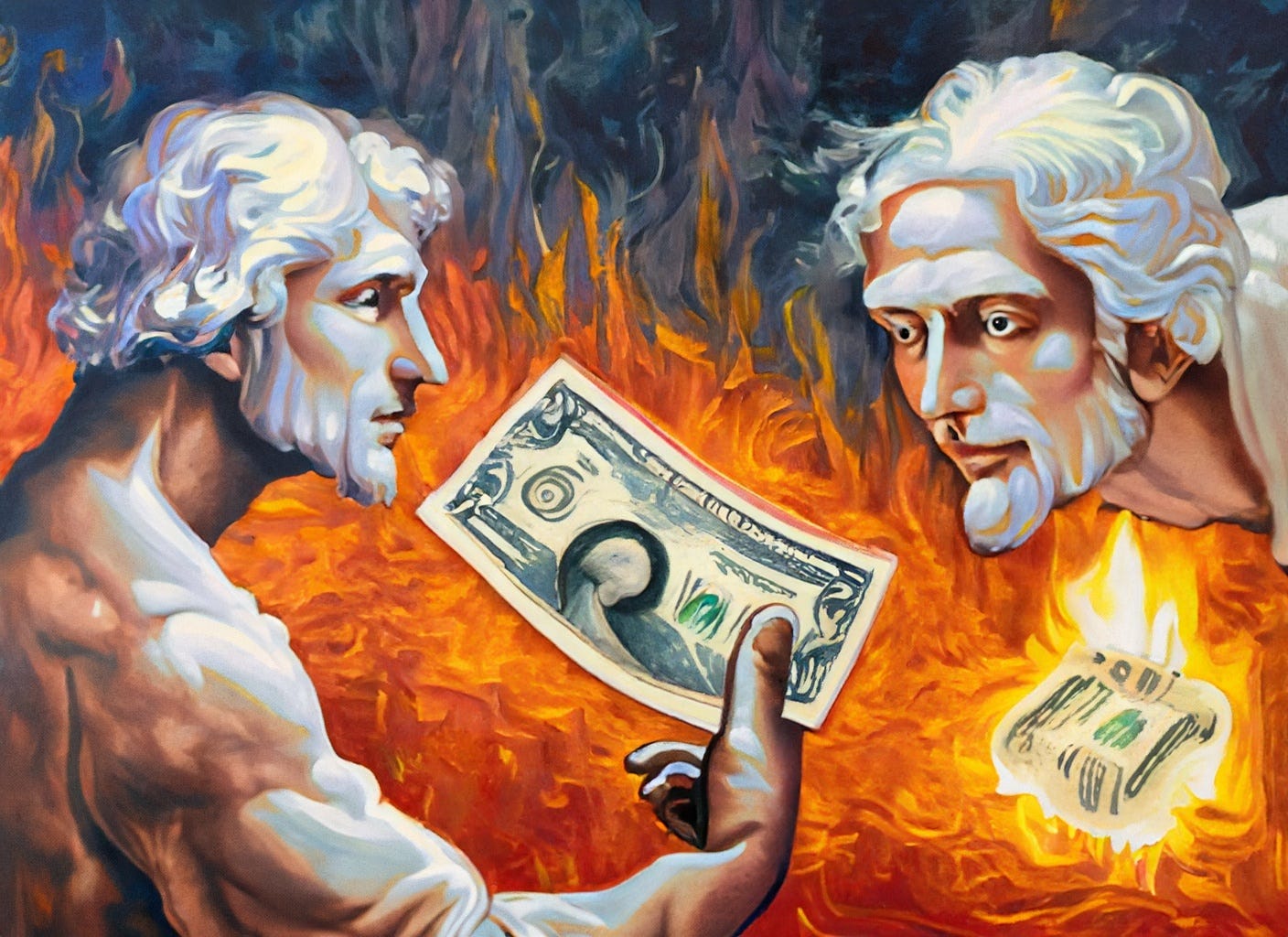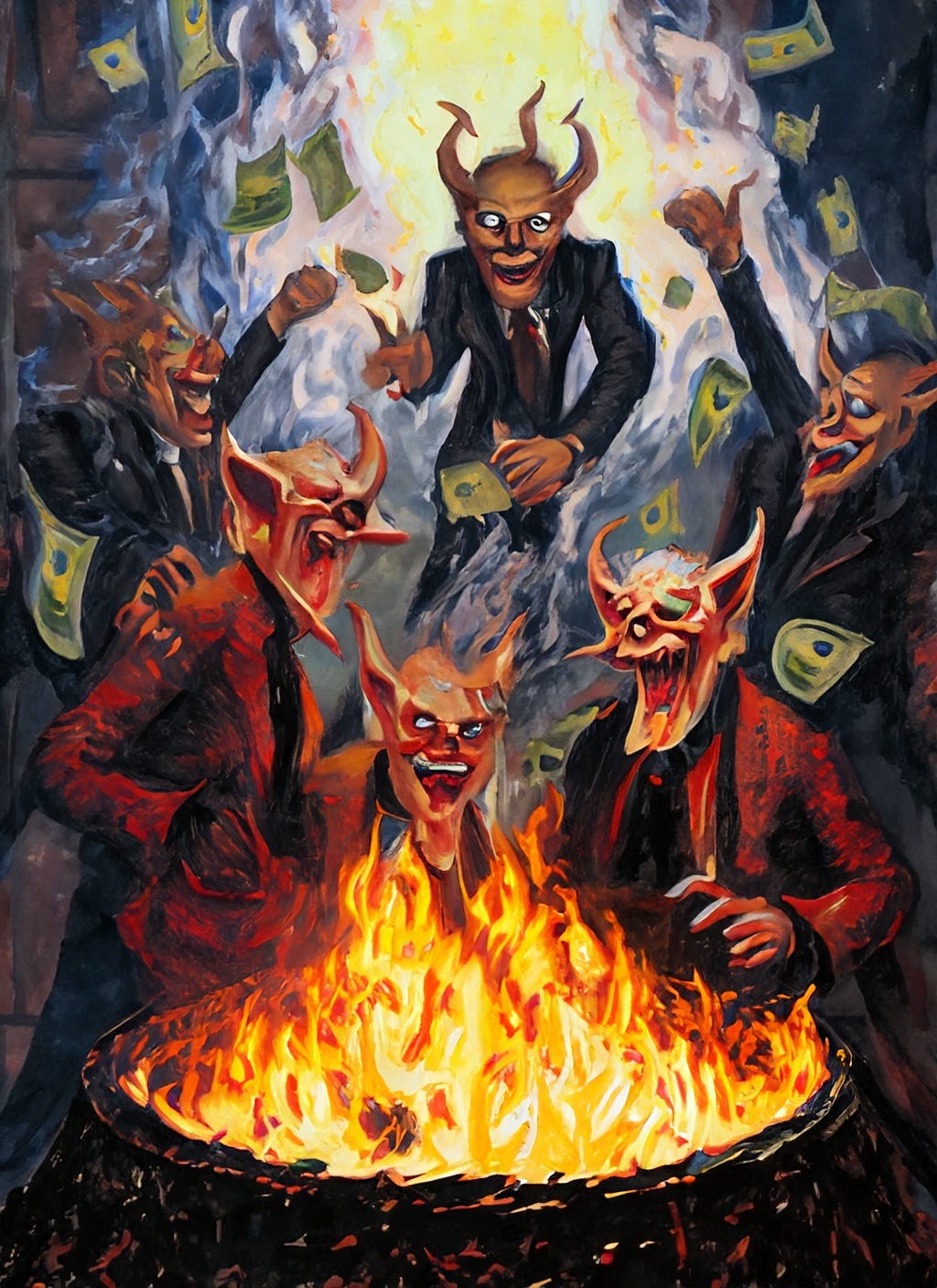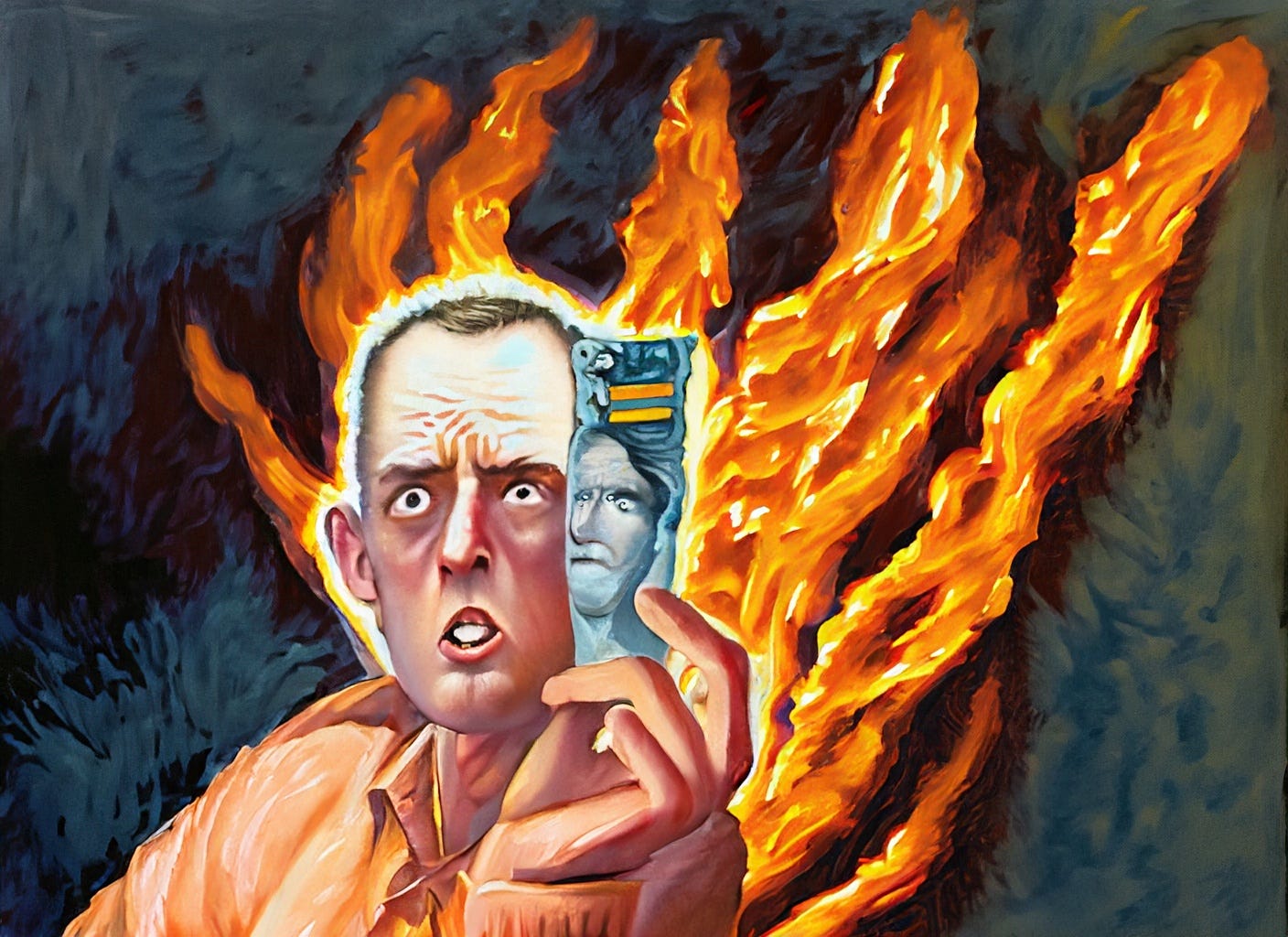THEY'RE STEALING EVERYTHING FROM YOU.
An analysis of the growing tax burden you face as a British Citizen.
The British government is destroying your wealth. You cannot ignore this any longer. You cannot afford to be ignorant of these issues any longer. That money is your hard work, the sweat of your brow, the results of you breaking your back every day to earn a living, destroyed. Tax money is your money. Even if it’s taxed out of businesses, it is you, the consumer, AND you, the employee, that foots the bill.
There are many different layers to how the government erases your wealth. The goal with this article is to give the reader a strong framework in understanding exactly how you are being mugged. In this article, we will first explore your tax burden as anyone earning money today in Britain. Second, we will address inflation, and why you need to be concerned. Third, we will touch on energy prices, and use it as a case study about the difference between inflationary price rises, and supply disruption price rises, but also how government interference causes both. Finally, most importantly, will be about understanding HOW taxes and inflation are crushing your financial future.
Not only do they take everything from you, but they also proceed to fuck it all off directly into the sun. That whole topic will be covered in the next weekly article.
>The government taxes you in more ways than you know.
Your tax burden; there’s a lot to take in, so I’ll write it like a story; you give value to the economy through time, expertise, and hard work. For this, you are awarded a market rate salary. First, the government makes business more expensive through taxation and burdensome regulation, meaning that the business hiring you isn’t as prosperous, and can’t be as generous in your salary. Second, the reduced salary you earn is taxed upfront, right off of your payslip. Of what’s left, the bills you pay are inflated again by taxation and regulation. From there, your casual spending is usually taxed by VAT, adding an additional 20% to most prices. If you’re looking to have fun, you’re paying a huge additional tax on alcohol. Want to watch television? TV license fee. Like sugary drinks? Another tax. You also have to pay an additional council tax for the pleasure of existing in any part of the country. For any travelling, whether business or pleasure, you have an extortionate fuel duty. God forbid you have to travel through a ULEZ or a Congestion Charge zone too, because that’s more tax. Oh and you need to pay a Vehicle Excise Duty to own a car. Anything you have left when you die is taxed also. There are far more taxes not mentioned here, but this is a good baseline for understanding how little of your own money you get to keep, and how little of the money you spend is actually going towards the business you’re trading with.
Businesses have a far harder time of it than just the average citizen. It means starting a small business becomes an unnecessarily difficult endeavour. You’d think people would want more small businesses; they pay a premium on salaries compared to retail, they increase social mobility upwards, they bring more culture to the commerce of a particular area, and they’re personally invested in the local scene in a way that a multinational never could be. When it comes to business taxes, there are far too many to even begin listing. Spend any amount of time in financial departments of medium sized businesses (50 to 200ish) and you’ll be blown away. Business rates (a fancy term for tax) from local councils, on top of council tax for owned properties, on top of a climate change levy, on top of taxes paid for utilities, on top of a stamp duty, on top of VAT paid to maintenance and capital projects, on top of landfill tax, is just a small amount of taxes associated with just existing in a building as a small business, well before you even start businessing.
On a side note, it’s important to remember that there’s only one type of business that can withstand these prices; the established big players. As an example, if minimum wage was raised to £20 an hour across the country, it would flatten every small business. Conversely, it might eat into Tesco’s profits, but they’ll receive more business as the smaller businesses and more expensive retail stores are squeezed out. It’s the same with taxation. Even if Tesco has to pay a higher percentage, it can afford to because it has succeeded in becoming the biggest retailer, and has access to investment, capital, and credit that can keep it afloat. Smaller businesses are lucky to get access to loans and a modest overdraft. This is an important side note because small business is key to social mobility, and they naturally allow wealth to be more evenly distributed. As I touched on before, they are also more representative of local cultures and customs, preserving and growing its own society with its own stories, histories, local knowledge, and customs. Small businesses in many ways are purveyors of beauty and culture, and to flatten them so blatantly with overburdensome regulation and taxation is a direct attack on that very beauty and culture. Tesco’s has an important place as a space for access to abundant cheap food and easy employment, but it will never be the vitality and character of a community.
So not only is the value of your money erased, but the costs and thus the prices that businesses have to offer for their goods and services are blown out of proportion by their own tax burdens. It means you’re hit with the double whammy. As a triple whammy to your social mobility, it also makes getting into business much harder, especially if it’s brick-and-mortar. It is with great shame that the government takes this much out of the British public.
And if all of that wasn’t enough, there’s inflation.
>Inflation is an invisible but VERY real additional tax.
Inflation explained simply; more cash chasing the same amount of resources. When the government creates money out of thin air, it doesn’t increase the amount of resources in the world. For example, in the past, £10 buys you 10kg of resources. When you print another £10, both of those tenners together are still going after the same 10kg of resources. It means that 10kg now costs £20. And it’s not like the guy selling the resources is making double the money; the money is halved in value. It might feel good in a moment, and in the short term it might make you feel richer, but inflation comes back hard.
There is always a “Hawking radiation” of inflation in any economy. A small, but persistent inflation is helpful to giving the economy some lubrication for growth. But the inflation we see in the UK is gigantic, and it comes from one thing; the government printing money. This has been known as “Quantitative Easing”, a highly perverted way to avoid saying “creating money out of thin air”. Through a scammy agreement with a partially government controlled central bank, money can be invented out of thin air. It’s similar to how FTX scammed people with their fake digital currency known as FTTs; they print this piece of paper, tell themselves it’s worth £X, and then leverage that asset with co-conspirators to get a hold of cash. The only difference is that bonds (the government’s version of fake digital currency) is backed by the government, which for now, seems like a sound investment for the central banks. FTTs were backed by a man-child drug addict. But to be very clear; money is created out of thin air by the government, and then spent on things. This puts more money into the economy, without adding any extra resources, meaning prices goes up.
Politicians, bureaucrats, ideologically captured journalists, and rental experts work very hard to keep you ignorant as to what inflation is. They want you to believe that inflation is caused by greedy businesses and greedy billionaires raising prices. This misses the point so fundamentally and in so many different ways, that it can’t just be idiocy, it has to be malice. Any basic level economics student can tell you that fortunes are made by lowering prices and lowering costs, not by increasing prices. Companies, since the free market began, go bankrupt when they’re forced by market conditions to raise prices. People do NOT, and never have, reacted well to price rises. It’s a well understood phenomenon that raising the price instantly destroys any loyalty you might have. They lie and they lie and they want you to believe that it is the direct fault of the government, when all blame can only be laid square at the feet of ideologically lazy politicians.
The way inflation is measured is usually quoted in CPI, or Consumer Price Index. It’s just a fancy way of taking the cost of a “basket of goods” at a supermarket, and comparing it to the past. If prices are 2% higher, CPI measures inflation at 2%. This is the number you typically see on the news.
I want to put a point across to the reader about measuring inflation; that very basket of goods is amongst the most competitively priced goods on the market. Food markets are extremely fast at reacting to bringing prices down, because there are so many competitors working very hard against each other. Fortunes are made in the food industry by decreasing prices, increasing quality, and increasing availability; when they’re throttled by inflation, these elements are pushed in the wrong direction, and, to the utter horror of all directors and shareholders, they’re forced to raise prices, and hope that it doesn’t destroy their credibility and customer loyalty (which it will). It also doesn’t measure the decrease in quality. Shrinkflation is when products get smaller, and in that same vein, lower in quality. This exacerbates the problem with inflation in a way that isn’t even measured. It means more business corners get cut, more jobs are eliminated, dinner is smaller, and on top of all that, it’s more expensive.
So when you see inflation measurements, you must understand that this % increase cannot be described as an average, or a mean, or some kind of accurate reflection as to where inflation is generally. We know from our own eyes that prices are skyrocketing well past any “6%” level. That % of inflation on the news is better understood as a bare minimum in increase, and that everything else is well beyond that.
You need to consider inflation, especially high inflation (above 2%), to be a catastrophic failure of government. It taxes everything you’ve saved, and it taxes everything you’ll ever earn, in a way that cannot be seen with your eyes until the prices start climbing. It’s an apocalyptic attack on your wealth. It reduces the purchase power of your money, it erodes the value of your savings, it makes money more expensive to borrow with higher interest rates that come hand-in-hand with money printing, and worse than everything, it creates a pessimistic and uncertain environment where those necessary risk-takers stop taking risks, and stop innovating, and stop investing. There is knock-on after knock-on that does so much to damage the economy that it can erase a generation of progress, and many are beginning to notice exactly that affect becoming more and more obvious.
>Putin-flation.
As war once again rages in Europe between colossal superpowers, the first thing everybody noticed was the price of fuel and food skyrocketing. I want to take a special paragraph to mention the uproar around energy prices. This isn’t necessarily inflation; it’s just the price of something going up because the resources has become more volatile and scarce. The big picture from this case study is what government interference does to the market, where heavy handed and highly unintelligent strategic moves costs everyone even more money. Alongside inflation, it’s a fine example of the triple-whammy of pain for the average consumer.
Price rises on fuel and food owe much to the most classic of economic disasters; demand hasn’t changed, but supply has collapsed. This has been a useful scapegoat for morally vacant politicians; they can blame food and fuel price rises on Putin. To some degree it’s true, as uncertainty causes prices to rise, and there was a very real shock caused by the sudden outbreak of war after Putin’s invasion of Ukraine. But even then, there’s a few dodgy details being hidden by the politicians. Donald Trump went to Germany during his presidency and told the local sneering politicians that it was dangerous to be so reliant on Russian oil and gas, lest the relationship between the West and Russia sour. Germany had become reliant on Russia because of an obsession with highly volatile, highly expensive, and extremely slow-to-build renewable energy sources. Other more eastern European nations like Poland were happy in their reliance as they never really had a conflict with Putin. So reliant upon Russia everyone was, that even at the advent of war, it took a long time for governments to fully enact bans on buying Russian oil and gas, meaning they were funding a war against Russia whilst funding Russia in its war against Ukraine (and the West).
In this instance, whatever your belief system, it was the worst played game of chess ever; the governments of the West interfered in energy production, meaning capacity to produce energy and to withstand shocks was reduced; then it was CIA and NATO provocation that provided the foundation for war in Ukraine against a major energy supplier to the West; and to top it all off, an attack by the USA on Europe’s energy infrastructure that sent an extremely critical €20,000,000,000 pipeline up (literally) in smoke. A trifecta of failure that led to the natural results of a trifecta of failure; we made ourselves vulnerable, got attacked by enemies and allies, and even funded our own opponents in war.
Fingers are often pointed at energy companies. To the delight of politicians, a most base reaction to increasing fuel prices is shaking one’s fist at the BP logo. The government was of course quick to turn a fake crisis into an opportunity. Remember the “windfall tax”? An ongoing tax on the energy companies that made “record profits”? It is a taxation that is layered in lies and intellectually bankrupt beliefs. There’s a lot to unpack here, so let’s look at it as a mini-case study within a case study.
The profits were only “record” because inflation had erased much of the value of the money that was being earned. The profit might have appeared much larger, but the value of the money wasn’t necessarily the same.
The “record profits” were only 3-5% of the total revenue of the organisation. Between costs and taxes, they’ve never really exceeded this bracket in recent history.
As a sub-point to the 3-5% of total revenue being profit, remember that the government is taking a much larger share, risk-free. Money lost to tax accounts for 16% of the entire revenue of the organisation, not including many taxes, fees, and licenses paid throughout the supply chain.
BP and most energy companies are publicly traded, and on the S&P 500. If you have any money saved, or invested at low risks, you’re being taxed directly.
10% of the shareholders of BP are UK state pensions. Which means that it’s a tax on your own pension.
It’ll increase the price of fuel more. That one is obvious.
And all of this was justified so the government could send a few hundred quid to some people on benefits. They took from you, your pensions, your investments, and your opportunities, and gave a few people a few quid. It’s beyond corruption when the BBC or any mainstream media organisation never even questioned it at any level.
This area is complicated, but it can be understood with some attention and intellectual investment. You can blame Russia, and you’re fairly right. You can blame America, again, you can be pretty correct. You can blame Western governments, and you’re spot-on: it was specific actions taken again and again by the West that created this situation. It has directly made you and all successive generations much poorer.
>How it all affects you.
It’s an utterly brutal, compounding taxation that makes every Briton significantly poorer. You want to reach the bottom of the barrel? Well here it is; there’s a big irony that’s built-in to over taxation. When you raise taxes, you get less tax revenue. This is known in economics as the “Laffer Curve”. Taxpayers react to over taxation by not paying more taxes. They rearrange their finances in different ways until they pay very little tax. They work less hard, they produce fewer innovations, they invest less of their money, they spend a far higher percentage of their disposable income, they get into more debt, and ultimately many leave the country. When you raise the taxes up so high, they just decide to take their innovations and businesses out of the country. The opposite is also true; lower taxes encourage people to work more, invest more, and save more. It means the government is reaching lower and lower into the barrell for more and more, instead of being a bit more patient and allowing it to fill up.
One major issue that never gets mentioned is that higher salaries push you into a higher tax bracket. As salaries grow, more and more people will find themselves losing nearly half of any extra income over £50,000 to tax alone. You might scoff at having sympathy for people in that position, but it’s damaging to all social mobility. People who work hard to provide value for the economy their whole lives are more and more being pushed into tax brackets that take nearly half of their salary right off the top, before anything. These are the people we need in society; hard working men and women, and yet it is exactly these kinds of tax brackets that force these earners to leave the country and take their valuable skills, contributions, and money elsewhere.
So you’re hit right off the bat by income taxes, and everything you buy is over taxed, and when you die, the Sheriff of Nottingham puts its greedy scaly fingers in your clothes and takes its cut. Great quantities of wealth are extracted from you throughout your life; think, what percentage of the value you give society is reduced by taxation? Could it be as much as half, or more? The problem is the compounding nature of taxation; 20% here, 12.5% there, 25% on this too… the same £1 must be taxed into oblivion after only 5 transactions. It’s difficult to describe the scale of the robbery. The worst thing is we can’t see what’s missing; we can’t see all the small businesses that never existed, we can’t see all the extra money we should have in our pockets, we can’t see the prosperity that should be abundant in every part of the country. What we do see is poorer people made poorer, pushed more and more towards black market work be it drugs, theft, or just plain old cash-in-hand honest work. It means they might be able to earn more in the short term but they lose all access to potential for credit, and they’re looking over their shoulder the rest of their life. It means communities get poorer, it means more people end up in poverty. It takes generations to get out of poverty, it takes a few years to put someone into it.
The American Revolution started over a 3% income tax. We need to find the same energy.
>TAKE ACTION.
My dad once made a comment that stuck with me. “The country moves forward in spite of the government”. It stuck with me, all through my work in the civil service especially, and it felt truer and truer the more I learned. 90% of government spending and apparatus could evaporate overnight, and the country would likely continue as if nothing happened.








